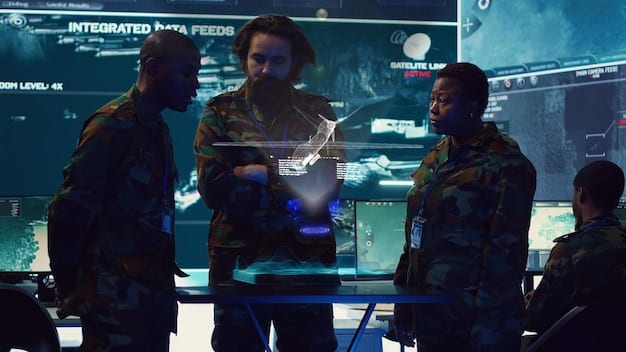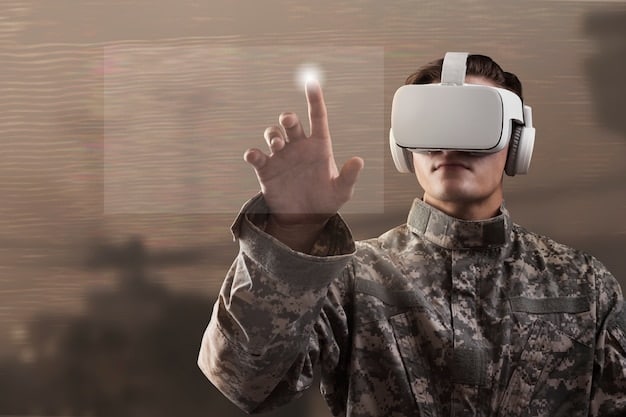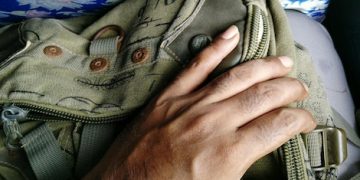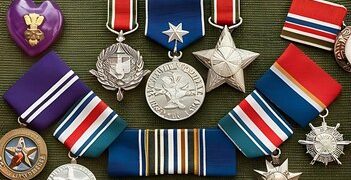The Evolution of Military Training: A Look at What’s New in 2025

The Evolution of Military Training in 2025 focuses on incorporating advanced technologies, personalized learning approaches, and enhanced psychological resilience training to prepare soldiers for future warfare challenges, emphasizing adaptability and critical thinking.
The landscape of military training is constantly evolving, and 2025 promises to bring significant changes. This article explores the Evolution of Military Training: What’s New in 2025? and how these advancements will shape the future soldier.
The Technological Revolution in Military Training
Military training is undergoing a significant transformation fueled by technological advancements. These changes aim to create more effective, efficient, and realistic training environments. By 2025, we can expect to see even greater reliance on technology to prepare soldiers for the complexities of modern warfare.
Technology is not just about gadgets and gizmos; it’s about fundamentally changing how soldiers learn and adapt. The integration of sophisticated systems enhances realism, provides personalized feedback, and allows for continuous improvement, essential elements in preparing for future threats.
Simulated Environments and Virtual Reality
The use of simulated environments and virtual reality (VR) is revolutionizing military training. These technologies allow soldiers to experience realistic combat scenarios without the risks associated with live exercises.
Augmented Reality (AR) Applications
Augmented reality (AR) is another emerging technology with immense potential. AR enhances real-world environments with digital information, providing soldiers with real-time data during training exercises.
- Realistic Combat Scenarios: VR creates immersive simulations of combat situations, allowing soldiers to practice their skills in a safe environment.
- Cost-Effective Training: Utilizing VR and AR reduces the need for expensive live exercises and minimizes wear and tear on equipment.
- Personalized Feedback: These technologies provide real-time data and feedback, allowing soldiers to identify areas for improvement and enhance their performance.
- Adaptability: Simulated environments can be quickly modified to reflect new threats and tactics, ensuring that training remains relevant and up-to-date.
The integration of VR and AR technologies into military training offers numerous advantages, from cost savings to enhanced realism. As these technologies continue to evolve, their role in preparing soldiers for future conflicts will only grow.

Personalized Learning and Adaptive Training Systems
Gone are the days of one-size-fits-all military training. In 2025, personalized learning and adaptive training systems are set to become the norm. These approaches recognize that each soldier learns differently and at their own pace, leading to more effective and efficient training outcomes.
Adaptive training systems use data analytics and artificial intelligence to tailor training programs to individual needs and capabilities. This ensures that soldiers receive the specific instruction and practice they need to excel, ultimately enhancing overall readiness and performance.
Data-Driven Insights
Data analytics plays a crucial role in personalized learning. By collecting and analyzing data on soldier performance, training programs can be adjusted to address specific weaknesses and build on strengths.
AI-Powered Training Programs
Artificial intelligence (AI) is used to create adaptive training programs that adjust in real-time based on a soldier’s performance. AI not only personalize the approach but also make it more responsive.
- Individualized Learning Paths: Training programs are tailored to each soldier’s learning style, ensuring they receive the specific instruction and practice needed.
- Real-Time Feedback: Adaptive systems provide immediate feedback, helping soldiers to identify and correct errors quickly.
- Continuous Improvement: By tracking performance data over time, training programs can be continuously refined to maximize effectiveness.
- Enhanced Engagement: Personalized learning increases soldier engagement and motivation, leading to better retention and performance.
Personalized learning and adaptive training systems are poised to revolutionize military education. These approaches not only improve the efficiency and effectiveness of training but also create a more engaging and rewarding learning experience for soldiers.
Enhancing Psychological Resilience and Mental Preparedness
Modern military training recognizes the importance of psychological resilience and mental preparedness. Soldiers must be equipped not only with physical skills but also with the mental fortitude to handle the stresses of combat. By 2025, training programs will place an even greater emphasis on developing these critical psychological attributes.
Mental preparedness is just as vital as physical readiness. Techniques to enhance resilience and manage stress are crucial for maintaining peak performance, especially in high-pressure environments.
Stress Management Techniques
Training programs are incorporating stress management techniques, such as mindfulness and meditation, to help soldiers cope with the demands of military life.
Cognitive Behavioral Therapy (CBT)
Cognitive Behavioral Therapy (CBT) is an effective tool for enhancing psychological resilience. CBT helps soldiers identify and modify negative thought patterns, improving their ability to handle stress.
- Mindfulness Training: Soldiers learn to focus on the present moment, reducing stress and improving concentration.
- Resilience Building Exercises: Activities designed to build mental toughness and the ability to bounce back from adversity.
- Peer Support Programs: Encouraging soldiers to support one another and share their experiences, fostering a sense of camaraderie.
- Mental Health Resources: Providing easy access to mental health professionals and resources, reducing the stigma associated with seeking help.
Enhancing psychological resilience and mental preparedness is essential for maintaining a healthy and effective military force. By equipping soldiers with the tools they need to manage stress and adversity, military training programs are ensuring they are ready for the challenges of modern warfare.

Focus on Urban Warfare and Asymmetric Threats
The nature of modern warfare is shifting, with an increasing focus on urban environments and asymmetric threats. Military training is adapting to reflect these changes, preparing soldiers for the unique challenges they pose. By 2025, training programs will place a greater emphasis on developing the skills and tactics needed to succeed in these complex scenarios.
Urban warfare demands a different skillset than traditional combat. Asymmetric threats require adaptability and critical thinking. Modern training methodologies will prepare soldiers effectively for urban combat and unconventional threats.
Close Quarters Combat (CQC) Training
Close Quarters Combat (CQC) training is essential for urban warfare. Soldiers learn how to navigate confined spaces, clear buildings, and engage with enemies at close range.
Counter-Insurgency Tactics
Counter-insurgency tactics are also critical in asymmetric warfare. Soldiers learn how to engage with local populations, gather intelligence, and disrupt insurgent networks.
- Urban Navigation Exercises: Training in realistic urban environments, simulating the challenges of navigating complex terrain.
- Scenario-Based Training: Exercises that mimic real-world situations, requiring soldiers to make quick decisions and adapt to changing circumstances.
- Cultural Awareness Training: Educating soldiers about the cultural norms and customs of different regions, improving their ability to interact with local populations.
- Intelligence Gathering Techniques: Training in how to gather and analyze intelligence, identifying potential threats and disrupting enemy activities.
The focus on urban warfare and asymmetric threats ensures that soldiers are well-prepared for the realities of modern conflict. By developing the skills and tactics needed to succeed in these challenging scenarios, military training programs are helping to keep pace with the evolving nature of warfare.
Cross-Cultural Competence and Language Skills
In today’s interconnected world, cross-cultural competence and language skills are increasingly important for military personnel. Soldiers are often required to work alongside allies from different countries and interact with local populations in diverse cultural contexts. By 2025, military training programs will place a greater emphasis on developing these essential skills.
Understanding and respecting different cultures can greatly enhance mission effectiveness. Linguistic abilities further aid in communicating and garnering trust. Therefore, cross-cultural awareness and language skills are vital attributes for today’s soldiers.
Language Immersion Programs
Language immersion programs are an effective way to develop language skills. Soldiers are immersed in a foreign language and culture, accelerating their learning and improving their ability to communicate.
Cultural Sensitivity Training
Cultural sensitivity training helps soldiers understand and respect different cultural norms and customs. This training is essential for building relationships with local populations and avoiding misunderstandings.
- Language Courses: Offering a variety of language courses tailored to specific regions and mission requirements.
- Cultural Exchange Programs: Allowing soldiers to spend time in foreign countries, experiencing different cultures firsthand.
- Role-Playing Exercises: Simulating interactions with people from different cultures, helping soldiers to develop their cross-cultural communication skills.
- Expert Lectures: Providing lectures from cultural experts, sharing insights into the cultural norms and customs of different regions.
Cross-cultural competence and language skills are essential for success in modern military operations. By investing in these skills, military training programs are ensuring that soldiers are well-prepared to operate in diverse cultural contexts and build strong relationships with allies and local populations.
Ethical Decision-Making in Complex Scenarios
Modern military operations often involve complex ethical dilemmas. Soldiers must be prepared to make difficult decisions in high-pressure situations, adhering to the laws of war and upholding ethical standards. By 2025, military training programs will place a greater emphasis on ethical decision-making, equipping soldiers with the tools they need to navigate these challenging scenarios.
The ability to make sound ethical judgments is paramount in military leadership. Immersive ethical training programs are designed to hone critical thinking and moral courage, which are essential for future battlefield scenarios.
Scenario-Based Ethical Dilemma Training
Scenario-based ethical dilemma training is an effective way to prepare soldiers for complex situations. Soldiers participate in simulations that present them with ethical dilemmas, requiring them to make decisions based on their values and the laws of war.
Discussions with Military Ethicists
Discussions with military ethicists provide soldiers with a deeper understanding of ethical principles and their application to military operations. Ethicists offer guidance and insights, helping soldiers navigate complex ethical issues.
- Case Studies: Analyzing real-world case studies involving ethical dilemmas, helping soldiers to learn from past experiences.
- Role-Playing Exercises: Simulating ethical dilemmas in a safe environment, allowing soldiers to practice their decision-making skills.
- Group Discussions: Facilitating open discussions about ethical issues, encouraging soldiers to share their perspectives and learn from one another.
- Guest Lectures: Inviting experts in military ethics to share their knowledge and insights, providing soldiers with a broader understanding of ethical principles.
Ethical decision-making is a critical skill for military personnel. By investing in ethical training programs, the evolution of military preparation can help ensure that soldiers are well-prepared to make sound ethical judgments in complex scenarios, upholding the values and standards of the military.
| Key Point | Brief Description |
|---|---|
| 🤖 Tech Integration | VR and AR create realistic training environments, enabling soldiers to practice in safe, simulated scenarios. |
| 🧠 Mental Resilience | Mindfulness and CBT techniques bolster soldiers’ ability to manage stress and enhance psychological resilience. |
| 🌍 Cross-Cultural Skills | Language immersion and cultural sensitivity training promote effective communication and understanding in diverse contexts. |
| 🎯 Adaptive Training | AI-driven programs tailor learning paths, ensuring each soldier receives personalized and effective training experiences. |
FAQ
▼
VR creates immersive, realistic simulations of combat scenarios. It allows soldiers to practice tactical skills, decision-making, and teamwork without the risks associated with live exercises.
▼
Military training focuses on counter-insurgency tactics, cyber warfare strategies, and techniques to dismantle terrorist networks. These practices ensure adaptability and preparedness for evolving threats.
▼
Mental preparedness enhances resilience and the ability to manage stress during combat. It also reduces rates of PTSD and boosts overall mission effectiveness, making it a crucial component.
▼
Personalized learning tailors training programs to individual strengths, learning styles, and needs. This individualized approach ensures soldiers get specific, relevant instruction, improving overall performance.
▼
Ethical training hones decision-making skills in dilemma situations. Meanwhile, cross-cultural competence fosters positive relations ensuring sensitive interactions with allies and local populations, leading to mission success.
Conclusion
The evolution of military training: what’s new in 2025 reveals an increased focus on technology integration, personalized learning, psychological resilience, and cross-cultural competence. These advancements are designed to prepare soldiers for the complexities of modern warfare, ensuring they are well-equipped to face future challenges.





